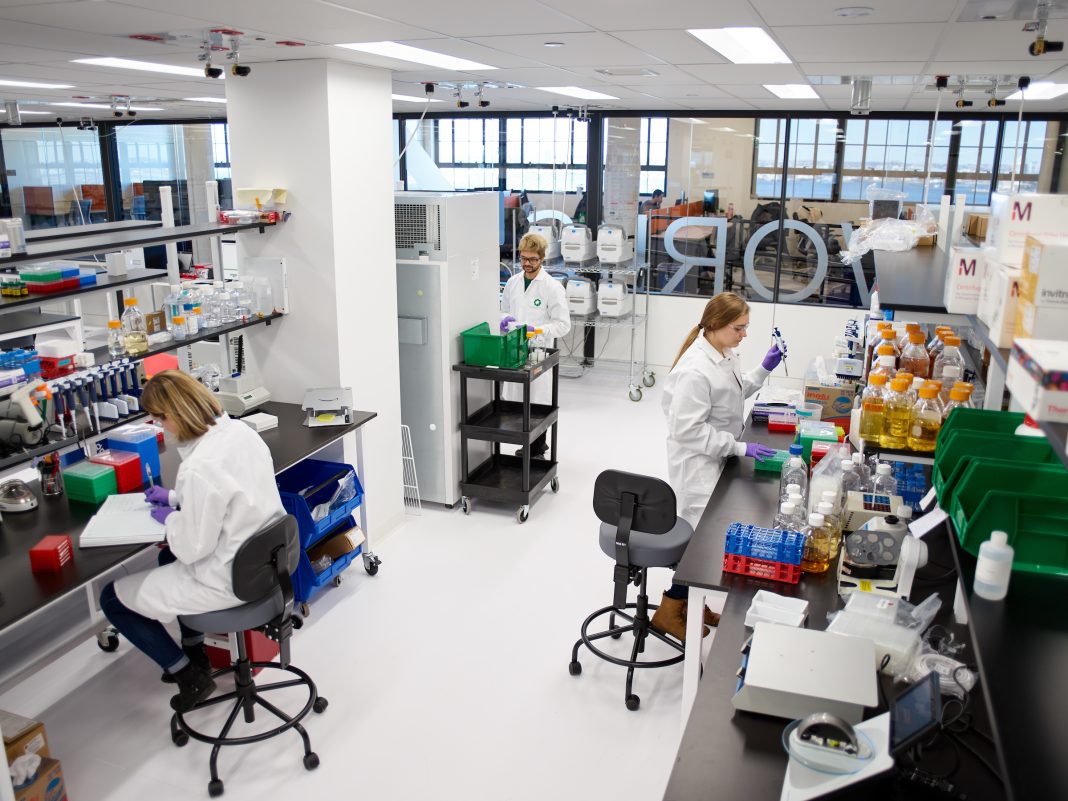
Nearly a year since a retreat from rosy revenue projections that led to its CEO quitting and its stock nearly collapsing, Zymergen has found a buyer in Ginkgo Bioworks, which has agreed to acquire the company for $300 million.
Ginkgo said the acquisition would enable it to enhance the capacity, capabilities, and efficiency of its horizontal synthetic biology platform—and thus accelerate its development—by integrating Zymergen’s complementary automation, software, and data science tools as well as biological assets.
Ginkgo said it planned to integrate Zymergen’s core automation and software technologies for scaling strain engineering capacity into its Foundry, including Zymergen’s machine learning and data science tools for exploring known and unknown genetic design space.
Ginkgo added that its customers will also benefit from the expansion of its Codebase library of biological assets that would result from the deal.
“We have always had incredible respect for the Zymergen team and the strength of the technologies that they have built for cell programming,” Jason Kelly, PhD, CEO and co-founder of Ginkgo Bioworks, said in a statement. “We are thrilled to integrate Zymergen’s capabilities into our Foundry, which we expect to accelerate the growth of our platform as we continue to deliver on our mission to make biology easier to engineer for our customers, helping us drive down the costs of cell programming as we invest in scale.”
Zymergen’s core technical team is expected to help fill significant planned hiring by Ginkgo across its cell engineering, automation, digital technology, and data teams. That will give the companied company the advantage of accelerating efforts to scale up operations while minimizing incremental run-rate operating expenses, the companies said.
But the companies also acknowledged that Zymergen will continue cost-cutting efforts such as eliminating another 80 positions in addition to the 220 that were cut last year. Zymergen began the cost cutting after disclosing the financial woes that help explain why the company is selling for a relatively low price.
The $300 million purchase price is just one-tenth of Zymergen’s approximately $3 billion valuation at the time of its eye-popping $575 million initial public offering (IPO), completed in April 2021.
Over three months later in August 2021, Zymergen became vulnerable to a takeover after it lost 68% of its share price. That near-collapse came after the company acknowledged that it will make no product revenue this year and “immaterial” revenue in 2022 due to unspecified technical problems with its lead product. Zymergen’s then-CEO Josh Hoffman stepped down from the company’s helm and its board—by “mutual decision,” the company said at the time.
Succeeding Hoffman on an interim basis was Zymergen’s board Chairman Jay Flatley, who just three months earlier had stepped down from Illumina’s board after 22 years of leading the sequencing giant as CEO, executive chair, and later chairman.
“World-class and innovative”
“At Zymergen, our team has built a world-class and innovative technology platform which will complement Ginkgo’s cell programming capabilities,” Flatley stated. “We’re excited about the opportunities created by combining our technologies to accelerate Ginkgo’s platform development to better serve customers, promote Zymergen’s public benefit purpose, and achieve our shared vision of sustainability and a world built on biology.”
“The transaction also represents a compelling opportunity for our stockholders to participate in the future growth and upside potential of the combined company,” Flatley added.
As interim CEO, Flatley oversaw cost-cutting efforts designed to extend its cash runway in order to fund operations to mid-2023, as well as creation of a three-year strategic plan. Under Flatley, Zymergen discontinued the first product it brought to market in December 2021, the transparent polyimide film Hyaline, after acknowledging unspecified technical issues.
The company develops products in three businesses: advanced materials, drug discovery, and automation. The advanced materials products focus on four specialties: agriculture, water repellency, advanced polymers, and enzymes. In drug discovery, Zymergen applies its metagenomic database to uncover molecular matter that inhibit targets of interest, focused initially in oncology and on partnerships with biopharmaceutical companies. In January, Zymergen began offering our proprietary automation technology to outside customers.
“I hope it’s clear how we’re managing the business to create multiple successful products and that we have an engine feeding that pipeline with new opportunities. It is our burden to demonstrate that we can execute technically and commercially against our plans,” Flatley told analysts during Zymergen’s quarterly conference call in May. “The market is hungry for a new generation of technology that will transform the way materials are manufactured. We’re confident that Zymergen will be a significant contributor to that future.”
Zymergen said it will evaluate strategic alternatives for its Advanced Materials and Drug Discovery segments. “Certain downstream assets could be sold or spun [e.g. therapeutic assets, enzymes, advanced polymers and other established functional chemistries],” Laurence Alexander, CFA, equity analyst with Jefferies, wrote in a research note praising the deal.
“The Zymergen acquisition will deepen Ginkgo’s automation and software capabilities, which should improve economies of scale and engineering capacity. The transaction also expands Ginkgo’s strain library and discovery tool kit,” Alexander added.
Investors responded positively to the acquisition announcement by sending the company’s shares jumping 16% on Monday, from an even $2 a share to $2.32. Ginkgo shares however fell nearly 5%, from $2.92 to $2.78 a share.
In its most recent quarter for which it has disclosed results, Zymergen said it finished the first quarter with a $72.116 million net loss—narrower than its $84.585 million net loss of Q1 2021—on revenue that grew 28%, to $4.791 million from $3.735 million a year earlier.
Sustained net losses
Since its inception through the first quarter of this year, Zymergen said in its most recent quarterly filing, it has incurred cumulative net losses of $1.2 billion.
“The company has sustained operating losses and expects to continue to generate operating losses for the foreseeable future,” Zymergen stated in the filing. “While the company has signed a number of initial customer R&D services and collaboration contracts, revenues have been insufficient to fund operations.”
As a result, Zymergen added, it has funded the portion of operating costs that exceed revenues “through a combination of proceeds raised from equity and debt issuances.”
However, the company also warned: “If we are unable to raise additional capital to fund our operations, we will be required to significantly reduce our operating expenses and may not be able to continue as a going concern.”
Zymergen had unrestricted cash and cash equivalents of $336.98 million as of March 31, 2022, down 13% from $386.105 million at the end of last year.
Ginkgo finished the first quarter with a net loss of $592.593 million, more than seven times the $73.569 million net loss it reported for Q1 2021. The company’s total revenue more than tripled, to $168.405 million from $44.097 million in the year-ago quarter.
“We have a history of net losses. We expect to continue to incur losses for the foreseeable future, and we may never achieve or maintain profitability,” Ginkgo acknowledged in its most recent quarterly filing.
As of March 31, the filing added, Ginkgo reported an accumulated deficit of approximately $2.888 billion.
“We may incur losses and negative cash flow from operating activities for the foreseeable future as we continue to invest significant additional funds toward further developing our platform, the cell programs we perform on behalf of our customers and otherwise growing our business,” Ginkgo acknowledged. “Our operating expenses have increased as a result of becoming a public company, and we expect that our operating expenses will continue to increase as we grow our business.”
Last year, Ginkgo went public through a $17.5 billion merger with a special purpose acquisition company (SPAC) that is expected to provide up to $2.5 billion of gross cash proceeds.
As of March 31, Ginkgo enjoyed cash and cash equivalents totaling $1.493 billion—down nearly 4% from $1.55 billion as of December 31, 2021.
Largest acquisition
Ginkgo said its purchase of Zymergen was its largest acquisition since it was launched in 2008 by co-founders who had worked together for close to 20 years since meeting at MIT. Their goal was to develop a platform that could program cells as easily as computers across a wide variety of applications—including food, agriculture, industrial chemicals, and pharmaceuticals.
Applications of the cells produced by Ginkgo range from climate change to food security to pandemic response.
Ginkgo’s engineering and data platform applies advanced robotic automation, proprietary software, and data analytics toward continuous improvement, both of its “Foundry” technology and the knowledge and re-usable biological assets or “codebase” required to engineer cells for the company’s various applications.
The deal, unanimously approved by the boards of both companies, is expected to be completed by the first quarter of 2023 subject to approval by Zymergen stockholders, regulatory approvals, and satisfaction or waiver of other closing conditions.
Ginkgo agreed to purchase Zymergen in an all-stock transaction through which Zymergen stockholders will receive 0.9179 Ginkgo shares for each Zymergen share, representing 5.25% pro forma ownership of Ginkgo following the transaction.
The Zymergen acquisition was one of two platform-building moves announced Monday by Ginkgo. The company also agreed to acquire for $83 million Bayer’s 175,000-square-foot Biologics Research & Development site in West Sacramento, CA—as well as the team, internal discovery operations, and lead optimization platform based there. That purchase is expected to close in the fourth quarter.
In West Sacramento, Ginkgo also plans to integrate R&D platform assets it will acquire from Joyn Bio, a joint venture formed in 2017 by Ginkgo and Bayer’s equity investment arm Leaps by Bayer. Joyn was created to engineer microbes for agricultural applications, starting with enhancing sustainability through nitrogen fixation.
Ginkgo said Bayer will be the first major partner of its expanded agricultural biologicals platform, with the companies agreeing to launch a new collaboration focused on advancing Joyn’s nitrogen fixation program, as well as new programs in areas that include crop protection and carbon sequestration.
Under the companies’ three-year strategic partnership, Ginkgo agreed to provide research services to Bayer in agricultural biologicals with the potential to earn royalties on net sales from products developed under the partnership.
“Agricultural biologicals have the potential to boost crop yields while simultaneously offering environmental benefits to growers, and Ginkgo’s technologies will help to deliver on biologicals’ potential,” said Bob Reiter, head of R&D for Bayer’s Crop Science Division.

